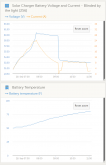Hinchebyinch
New Member
- Joined
- Dec 17, 2019
- Messages
- 9
Hi. Thanks in advance for your help
I am in Haiti. My system is as follows
What would be the best settings for my voltage? Bear in mind that sometimes without warning (though rare at the moment) they will give an entire day of grid power, and sometimes they will not give any for a week or so
I am thinking............
Charge overnight with grid power
Set rebulk on the flexmax to a lower voltage, i.e. 12.1v, so if the batteries have had a charge overnight it will not bulk charge them again, and set the float at 13.2? (Trojan website says float at 13.5 but it seems high to be at that all day long?)
And then my panels should just produce enought to keep it at that voltage, thereby replacing what is taken out in near enough real time? That way there should only be an hour or two in the morning, and five or six in the evening where everything is powered just by batteries?
Also thinking maybe i can set the magnum inverter to charge at 30%? then it wont matter if they give grid power at the same time as im solar charging?
Really appreciate your help - Sam
I am in Haiti. My system is as follows
- 6 x Trojan t-105's (675ah 12v bank)
- Magnum 1500w inverter/charger
- Flexmax 80 mttp
- about 1000w solar on the roof
- I consume about 6 kwh per day of electricity
What would be the best settings for my voltage? Bear in mind that sometimes without warning (though rare at the moment) they will give an entire day of grid power, and sometimes they will not give any for a week or so
I am thinking............
Charge overnight with grid power
Set rebulk on the flexmax to a lower voltage, i.e. 12.1v, so if the batteries have had a charge overnight it will not bulk charge them again, and set the float at 13.2? (Trojan website says float at 13.5 but it seems high to be at that all day long?)
And then my panels should just produce enought to keep it at that voltage, thereby replacing what is taken out in near enough real time? That way there should only be an hour or two in the morning, and five or six in the evening where everything is powered just by batteries?
Also thinking maybe i can set the magnum inverter to charge at 30%? then it wont matter if they give grid power at the same time as im solar charging?
Really appreciate your help - Sam



